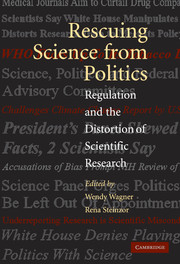Book contents
- Frontmatter
- Contents
- About the Contributors
- Acknowledgments
- Prologue
- Introduction: Principled Science
- PART I FREEDOM AND INDEPENDENCE
- PART II TRANSPARENCY AND HONESTY
- 5 The Data Wars, Adaptive Management, and the Irony of “Sound Science”
- 6 The Dual Legacy of Daubert v. Merrell-Dow Pharmaceutical: Trading Junk Science for Insidious Science
- 7 Using Science in a Political World: The Importance of Transparency in Natural Resource Regulation
- 8 Transforming Science into Law: Default Reasoning in International Trade Disputes
- 9 Two Models for Scientific Transparency in Environmental Law
- PART III A PUBLIC INFRASTRUCTURE FOR SCIENCE
- PART IV RECOMMENDATIONS AND CONCLUSION
- Index
8 - Transforming Science into Law: Default Reasoning in International Trade Disputes
Transparency and Default Reasoning in International Trade Disputes
Published online by Cambridge University Press: 04 August 2010
- Frontmatter
- Contents
- About the Contributors
- Acknowledgments
- Prologue
- Introduction: Principled Science
- PART I FREEDOM AND INDEPENDENCE
- PART II TRANSPARENCY AND HONESTY
- 5 The Data Wars, Adaptive Management, and the Irony of “Sound Science”
- 6 The Dual Legacy of Daubert v. Merrell-Dow Pharmaceutical: Trading Junk Science for Insidious Science
- 7 Using Science in a Political World: The Importance of Transparency in Natural Resource Regulation
- 8 Transforming Science into Law: Default Reasoning in International Trade Disputes
- 9 Two Models for Scientific Transparency in Environmental Law
- PART III A PUBLIC INFRASTRUCTURE FOR SCIENCE
- PART IV RECOMMENDATIONS AND CONCLUSION
- Index
Summary
Transparency in Law versus Transparency in Science
The principles of transparency that are part of the framework for this book, as applied to governmental fact finding, require the fact finder to make several aspects of decision making clear to all interested parties: the evidence behind a finding of fact, the fact finder's evaluation of that evidence, and the reasoning connecting the evidence to the finding. Ideally, all parties could understand which evidence the fact finder took into account and how the fact finder assessed the probative value of that evidence in arriving at the findings. A similar ideal of transparency occurs in science. The design and analysis of empirical studies should be so transparent that other scientists can critique the methods used and replicate the research. All interested researchers should have access to the data-gathering methods, if not the data itself, and should be able to evaluate for themselves the degree of evidentiary support for the scientific findings. With regard to transparency, therefore, law and science share the same ideal. There would seem to be no conflict of principles when scientists provide the evidentiary basis for legal fact finding.
From a legal perspective, this ideal of transparency is closely connected to other ideals: the predictability and legitimacy of the law, and the rule of law itself. If legal rules transparently govern the outcomes in particular cases, and if similar cases are decided similarly, then the law is more likely to be predictable and fair.
- Type
- Chapter
- Information
- Rescuing Science from PoliticsRegulation and the Distortion of Scientific Research, pp. 165 - 192Publisher: Cambridge University PressPrint publication year: 2006
- 3
- Cited by



